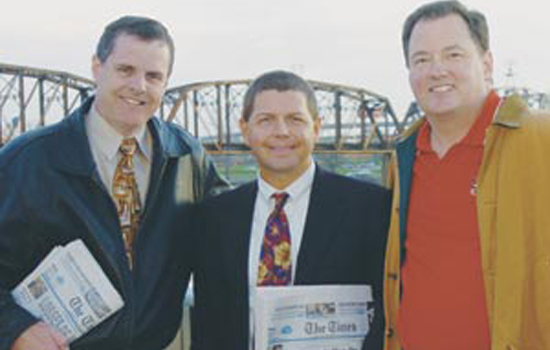Alums make news in Louisiana
Three RIT grads have top managment posts at The Times of Shreveport
Robert Ruiz/The Times
Making their mark on The Times of Shreveport, La., are, from left, Peter Zanmiller ’86, Alan English ’87 and Andy Swanton ’84.
RIT photography and printing graduates can be found at newspapers all over the country. At The Times of Shreveport, La., there’s an especially strong RIT connection, with alumni in three top positions.
Alan English ’87 (photojournalism), executive editor of The Times since 2004, was first of the three to arrive. He started as managing editor in 2000.
Peter Zanmiller ’86 (printing management), president and publisher, and Andy Swanton ’84 (printing management), project manager, both arrived in November 2006.
The three have spent all or most of their careers with industry giant Gannett Co. Zanmiller joined the company immediately after graduating from RIT, starting out as a USA Today production coordinator and later serving as production director for several papers, including FLORIDA TODAY. Most recently he was president and publisher of the Herald-Dispatch in Huntington, W. Va.
Swanton has had eight assignments with Gannett, starting in 1985 in Port Huron, Mich. Before Shreveport, he helped launch Gannett’s high-tech Central New York press center, which serves the company’s publications in Binghamton, Elmira and Ithaca.
After working as a photographer and photo editor at several newspapers in Tennessee, North Carolina, New Jersey and New York, English joined Gannett’s Rochester Democrat and Chronicle as assistant managing editor/photography in 1997. English served a stint as interim managing editor and spearheaded several special projects. He taught several courses at RIT as an adjunct.
All three agree that the past two decades have been a period of revolutionary change in the newspaper industry – and all have been on the front lines. In the mid-1980s, color photos were a novelty, until USA Today began pushing the envelope. The ’90s brought digital photography; English led the Democrat and Chronicle to become one of the first newspapers in the country to convert to all-digital.
Online editions, now ubiquitous, were a curiosity as recently as a decade ago. Now newspapers routinely feature slide and video galleries, audio, podcasts and reader-generated information including blogs and photos on their Web sites.
“ It’s exciting,” says Zanmiller. “We’re not just a newspaper anymore, we’re a multimedia company. People want immediacy, and we’re providing what people want. We’re organizing the newsroom to process and deliver news 24/7. That’s a big change.”
“ Innovation is the call of the day,” says English. Among the new ideas: “mobile journalists” or “mojos,” who cover and write stories, shoot video footage, and file reports from their cars for immediate use online.
“ The newsroom is now the information center,” says English.
Despite the emphasis on the Web, all three insist that print is not dying. In fact, The Times is making a major investment in that area, replacing antiquated letterpress equipment with offset presses, pre-press facilities and mailroom.
“ Readers will see major improvements, including increased color capacity and a modern page format,” says Swanton, who is spearheading the project.
English says that the goal of the business remains the same, no matter how the technology changes. “We’re here to make a difference, to keep people informed. We saw that during Katrina, when keeping the information flowing helped keep people alive. That’s what this is about. We unloaded everything we had to cover it.”
Shreveport, located in the northwest part of Louisiana, suffered minimal physical damage during the storm, but became a destination for thousands of evacuees. English says that although “the stain of Katrina” remains, progress is being made and New Orleans is ready to welcome tourists, whose dollars will help fuel the rebuilding.
Meanwhile, the three grads will be busy building a new, improved Times. Although coincidence brought them together in Louisiana, English finds the convergence “reassuring.”
“ There’s a commonality of experience that is understood,” he says. “RIT grads are motivated and always working to move forward.”









